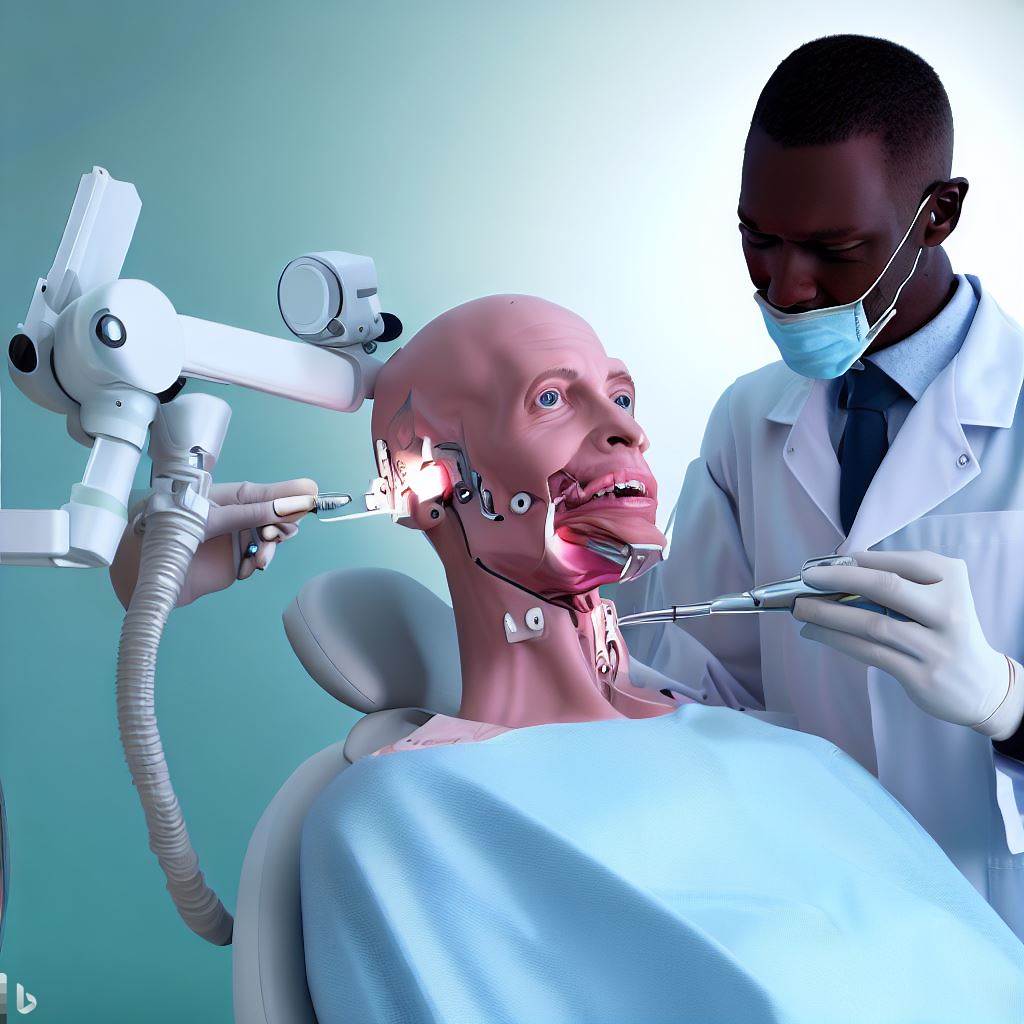Introduction
Nigerian dentistry, a thriving field, deserves a closer look at salaries and compensation.
Understanding dentists’ earnings helps professionals make informed career decisions and negotiate better.
Our blog sheds light on Nigerian dentistry’s financial aspect, empowering dentists to plan their future effectively.
Factors Affecting Nigerian Dentistry Salaries
Educational background and qualifications
- Dentists with advanced degrees and specialized training tend to earn higher salaries.
- Having additional certifications and staying updated on the latest dental techniques can also impact compensation.
Years of experience
- The longer a dentist has been practicing, the more likely they are to command a higher salary.
- Experience enhances skills and expertise, making dentists more valuable in the market.
Specialization and additional certifications
- Dentists who specialize in a specific field, such as orthodontics or oral surgery, often earn higher salaries.
- Obtaining additional certifications can also increase earning potential.
Location and setting of practice
- Salaries can vary depending on the geographical location and urban or rural setting.
- Dentists practicing in major cities generally earn higher salaries due to higher cost of living.
Type of institution or facility worked in
- Dentists working in private practices, hospitals, or government institutions may have different salary structures.
- In private practices, salaries might be influenced by the number and socioeconomic status of the patient base.
Professional reputation and patient base
- Establishing a good professional reputation and building a loyal patient base can lead to higher salaries.
- Word-of-mouth recommendations and positive patient reviews can attract more patients and increase income.
Basically, several factors contribute to the variation in salaries among Nigerian dentists.
Educational background, qualifications, years of experience, specialization, location, type of institution worked in, and professional reputation are all important considerations.
Dentists with advanced degrees, numerous certifications, and specialized skills generally earn higher salaries.
Practicing in urban areas or areas with higher demand can also result in increased compensation.
Establishing a positive reputation and building a loyal patient base can further enhance earning potential.
It’s important for dentists to continuously invest in their education, seek specialization opportunities, and strive for excellence in order to maximize their earning potential in the Nigerian dentistry industry.
Read: Educational Path to Dentistry in Nigeria
Salary Range and Average Compensation for Nigerian Dentists
Entry-level dentists without specialization
Entry-level dentists in Nigeria who have just graduated from dental school and do not have any specialization yet can expect to earn varying salaries.
These salaries depend on factors such as the dentist’s location, level of experience, and the size of the dental clinic or hospital they work in.
The salary range for fresh graduates can vary greatly, but on average, entry-level dentists in Nigeria can expect to earn between N500,000 to N1 million per year.
However, it is important to note that this range may increase or decrease based on the factors mentioned above.
On top of their salaries, entry-level dentists also receive compensation packages that can include benefits such as medical insurance, paid time off, and bonuses.
The average compensation package for entry-level dentists in Nigeria is around N1.2 million to N1.5 million per year.
Read: The Path to Becoming a Surgeon in Nigeria
Dentists with several years of experience
Dentists in Nigeria who have gained several years of experience in their field can expect higher salaries compared to fresh graduates.
The increase in salary is typically a result of their growing expertise and reputation in the dental industry.
The salary range for mid-career dentists can vary between N1.2 million to N2.5 million per year.
Dentists with more experience, a larger patient base, and a thriving dental practice may even earn higher salaries, reaching up to N4 million per year.
In addition to their base salaries, experienced dentists can also receive additional compensation, such as performance bonuses, profit sharing, and incentives based on patient satisfaction or revenue generation.
On average, experienced dentists in Nigeria can expect to earn a total compensation package of around N2.5 million to N4 million per year.
Specialized dentists
Dentists in Nigeria who choose to pursue advanced specializations in specific areas of dentistry, such as orthodontics, periodontics, or oral and maxillofacial surgery, can expect higher earning potentials.
The potential salary range for dentists with advanced specializations can vary significantly based on demand and rarity of the specialization.
Orthodontists, for example, can earn between N3 million to N7 million per year, while oral and maxillofacial surgeons can earn even higher salaries, ranging from N5 million to N10 million annually.
It is important to note that compensation variations exist based on the chosen specialization.
Specialized dentists may opt for private practices, earning higher incomes with a higher patient volume.
Others prefer public facilities or universities for fixed salaries, job security, research, and teaching opportunities.
In the end, the salary range and average compensation for Nigerian dentists vary based on their level of experience and specialization.
While entry-level dentists can expect salaries ranging from N500,000 to N1 million, experienced dentists with several years in the profession can earn between N1.2 million to N4 million per year.
Dentists with advanced specializations have even higher earning potentials, with salaries ranging from N3 million to N10 million annually.
Read: Dietitian Training Institutions: Top Picks in Nigeria
Additional Benefits and Perks in Nigerian Dentistry
Medical and dental insurance coverage
Nigerian dentists often receive comprehensive medical and dental insurance coverage. This ensures that they have access to quality healthcare and can address their own dental needs.
Retirement plans and pension schemes
Dentists in Nigeria also have the opportunity to participate in retirement plans and pension schemes. This allows them to save for their future and ensures financial stability after they retire.
Paid time off and vacation allowances
Nigerian dentists typically enjoy paid time off and vacation allowances. This allows them to take a break and rejuvenate, ensuring a healthy work-life balance.
Continuing education and professional development opportunities
The field of dentistry is constantly evolving, and Nigerian dentists have access to continuing education and professional development opportunities.
This allows them to stay updated with the latest advancements and improve their skills and knowledge.
Performance bonuses and incentives
Nigerian dentists may also be eligible for performance bonuses and incentives. These rewards recognize their hard work and dedication, motivating them to provide excellent dental care.
Overall, Nigerian dentists not only receive a competitive salary but also enjoy additional benefits and perks.
These benefits contribute to their overall satisfaction, work-life balance, and professional growth.
Having access to medical and dental insurance coverage ensures their own healthcare needs are taken care of.
Participating in retirement plans and pension schemes allows them to plan for their future and ensures financial stability.
Paid time off and vacation allowances enable them to take breaks and recharge, leading to better job performance.
Continuing education and professional development opportunities keep them up-to-date with the latest advancements in dentistry.
Performance bonuses and incentives recognize their efforts, motivating them to provide exceptional dental care.
These additional benefits make Nigerian dentistry an attractive and rewarding career choice.
Read: Challenges Faced by Dentists in Nigeria

Challenges and Limitations in Nigerian Dentistry Salaries
Economic factors affecting dental practices
- Fluctuations in the Nigerian economy can impact the financial stability of dental practices.
- High inflation rates and currency devaluation can decrease the purchasing power of dental professionals.
- Economic downturns can result in reduced patient demand for dental services, affecting income.
High cost of living and inflationary pressures
Nigerian dentists often face the challenge of maintaining a decent standard of living due to high costs.
Inflationary pressures can lead to increased prices of essential goods and services, reducing disposable income.
Dentists may struggle to meet financial obligations and save for the future amidst rising living costs.
Professional competition and market saturation
The dental industry in Nigeria is highly competitive, with a large number of dental professionals. Market saturation leads to fierce competition for patients, limiting the ability to charge higher fees.
Increased competition can exert downward pressure on salaries and hinder professional growth.
Government policies and regulatory limitations
Restrictions on dental practice ownership and operation can limit income potential for dentists.
Limited government funding for dental care programs may result in low compensation for dental professionals.
Excessive bureaucracy and complex regulations can pose administrative challenges that impact dental salary prospects.
Limited public awareness and perception of dental health
Many Nigerians have limited knowledge about the importance of dental health, leading to low demand for dental services.
Low public awareness often results in insufficient utilization of dental care, impacting dentist earnings.
Lack of appreciation for preventive dentistry contributes to a focus on treating dental issues rather than preventing them.
Despite the challenges and limitations, Nigerian dentists can still find opportunities for growth and financial success.
By adapting to economic fluctuations, dentists can diversify their income streams and invest wisely.
Collaborating with other dental professionals and expanding services can help overcome competition.
Active participation in professional organizations can advocate for favorable government policies. Increasing public awareness through educational campaigns and community outreach can also stimulate demand for dental services.
Overall, navigating the challenges in Nigerian dentistry salaries requires a proactive and strategic approach to ensure professional and financial fulfillment.
Read: Dietitian vs Nutritionist: Distinctions in the Nigerian Context
Tips for Negotiating Salaries and Compensation in Nigerian Dentistry
Research and gather salary data from reliable sources.
Before entering any salary negotiation, it is crucial to have accurate and up-to-date information about industry standards and prevailing wages in Nigerian dentistry.
Consult reliable sources such as professional organizations, industry reports, and online platforms to understand the salary range for your position.
Highlight your qualifications, experience, and expertise.
During negotiations, make sure to emphasize your unique qualifications, relevant experience, and specialized expertise that set you apart from other candidates.
Highlight any additional certifications or advanced training that can justify a higher compensation package.
Emphasize your potential contributions to the practice.
Showcase your value as an employee by discussing how your skills and knowledge can contribute to the growth and success of the dental practice.
Discuss your track record of achieving positive results and provide specific examples of how you have made a difference in your previous roles.
Consider non-monetary benefits and perks.
Salaries aren’t the only form of compensation to negotiate.
Consider non-monetary benefits and perks such as health insurance, vacation time, flexible working hours, professional development opportunities, or opportunities for growth within the practice.
These additional benefits can enhance your overall compensation package.
Be open to negotiation and establish a mutually beneficial agreement.
Approach salary negotiations with an open mind and willingness to come to a fair agreement. Understand that both parties have their own priorities and constraints.
Be prepared to discuss alternatives and find creative ways to meet each other’s needs while maintaining a mutually beneficial agreement.
In short, negotiating salaries and compensation in Nigerian dentistry requires thorough research, effective communication, and a focus on the value you bring to the practice.
By understanding industry standards, highlighting your qualifications and potential contributions, considering non-monetary benefits, and being open to negotiation, you can increase your chances of securing a favorable compensation package.
Read: How to Become a Medical Lab Technician in Nigeria
Conclusion
Discussing salaries in Nigerian dentistry is crucial for dentists to ensure fair compensation and professional growth.
Dentists should take an active role in negotiating salaries, seeking additional training, and exploring opportunities for career advancement.
The future of dental salaries in Nigeria is promising, with potential growth due to an increasing demand for quality dental care.
However, dentists must stay informed and adapt to changes in the industry to maximize their earning potential.
In summary, Nigerian dentists should not shy away from discussing their salaries, as it is vital for their professional development.
By being proactive in managing their careers and compensation, dentists can ensure they are fairly compensated and have opportunities for growth.
The future of dental salaries in Nigeria looks bright, but dentists must stay updated and adapt to industry changes to thrive in the profession.




